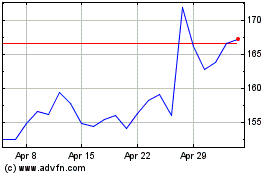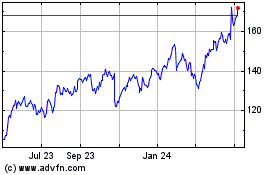By Heather Somerville
This article is being republished as part of our daily
reproduction of WSJ.com articles that also appeared in the U.S.
print edition of The Wall Street Journal (September 4, 2019).
The federal indictment announced last week against a
driverless-car engineer that accuses him of stealing trade secrets
from Google's parent company before he jumped to a rival is being
viewed as a warning to Silicon Valley that prosecutors may
scrutinize defections to competitors that involve sensitive
technology.
Legal experts who specialize in intellectual property say they
can't think of another example in which federal agents pursued an
expansive criminal case against a high-level U.S. tech employee
accused of taking proprietary material to a new job. Traditionally,
trade-secrets-theft cases have been brought by U.S. companies
against a former employee, not by the Justice Department.
"It does highlight the willingness of federal prosecutors to now
charge criminally what historically and traditionally might have
been viewed only as a civil noncompete dispute," said Jacob
Frenkel, a former senior counsel at the Securities and Exchange
Commission who is now in private practice.
The charges come as Silicon Valley companies build more
competitive and coveted technology, such as autonomous-driving
systems, and as businesses take advantage of a 2016 law that allows
companies to seek remedies in federal court for alleged
misappropriation of trade secrets.
The indictment reflects the Trump administration's priorities,
which include the enhanced protection of U.S. intellectual property
and more resources to pursue and prosecute alleged theft, according
to attorneys and federal prosecutors.
"These are the cases that really matter," said John Bennett, a
special agent in charge of the San Francisco field office of the
Federal Bureau of Investigation, at a press conference regarding
the alleged theft from Alphabet Inc.'s self-driving unit Waymo.
"And these are the cases that the FBI will continue to stand in the
breach to make sure our economy and our companies have the ability
to compete on the world platform." He said investigations of
trade-secret theft would remain a priority for the bureau.
In the Waymo case, Anthony Levandowski is accused of taking more
than 14,000 files a month before he resigned from Waymo and later
went to work for Uber Technologies Inc. After Mr. Levandowski's
departure, Waymo detected the downloads as part of a forensic
investigation, according to the lawsuit the company filed.
Waymo and Uber settled the suit last year, with Uber promising
not to use Waymo's technology. While Mr. Levandowski wasn't a
defendant in that case, the judge overseeing the trial referred the
allegations to the Justice Department.
Federal authorities announced last week that Mr. Levandowski, 39
years old, was charged with 33 counts of trade-secret theft during
his employment at Waymo.
Mr. Levandowski denies the charges. "The evidence in this case
is going to show conclusively Anthony did not steal anything, not
from Google, not from anyone," said one of Mr. Levandowski's
attorneys, Miles Ehrlich.
The Justice Department has encouraged companies to report more
digital crimes, including intellectual-property theft, and has
positioned itself as a partner of business rather than a foe.
Amy Hess, an executive assistant director at the FBI, urged at a
conference of technology executives and investors in July more
cooperation between the technology companies and government in
battling cybercrimes, including those involving intellectual
property.
"When companies see something -- activity that looks off -- we
are highly encouraging them to contact us," Ms. Hess said during an
onstage talk. "We need to bring in and encourage that type of
collaboration and coordination. We need each other to share
information."
While much of those efforts focus on defending against any
attempts in China to steal U.S. technology, they are also
contributing to stronger enforcement within U.S. industry,
according to industry and government lawyers.
The ability to move digital information makes it easier for
departing employees to take corporate secrets with them, said Josh
Rich, who heads the trade-secrets practice at the law firm
McDonnell Boehnen Hulbert & Berghoff. That has led to more
employee surveillance by companies and more scrutiny from the
FBI.
"It is a pattern that is becoming more and more familiar, and
Silicon Valley companies, having caught on to it, have begun
tracking and going back and seeing if they can halt the spread of
the information after the employee leaves the company," Mr. Rich
said.
Last year, U.S. authorities charged a former Apple employee with
stealing trade secrets after the company said it had discovered he
downloaded a blueprint related to self-driving cars onto a personal
laptop to bring to a car startup in China. Another former Apple
employee was arrested on similar charges earlier this year. Both
defendants have pleaded not guilty. In June, the augmented-reality
firm Magic Leap Inc. sued a former employee for allegedly stealing
designs to start a rival company, also in China.
Part of what makes Mr. Levandowski's case exceptional is that he
is a U.S. citizen who worked at an executive level for several U.S.
companies.
Mr. Levandowski has been one of the most prominent engineers in
his field. A robotic motorcycle he created for a 2004 national
competition now sits in the Smithsonian. His move to Uber
epitomized the talent battle involving Waymo, Uber, Lyft Inc.,
General Motors Co. and numerous startups to dominate in a new era
of driverless cars.
The charges against Mr. Levandowski carry a maximum sentence of
330 years and more than $8 million in fines. He pleaded not guilty
at his arraignment and was released on bail.
The indictment sends a message to aspiring technologists that
any questionable behavior regarding intellectual property is
extremely risky, according to technology investors and legal
experts.
"When executives see they themselves might be held responsible
for that too great a risk, it does have a chilling effect and may
diminish the willingness to do things that are close to the edge,"
Mr. Rich said.
Write to Heather Somerville at Heather.Somerville@wsj.com
(END) Dow Jones Newswires
September 04, 2019 02:47 ET (06:47 GMT)
Copyright (c) 2019 Dow Jones & Company, Inc.
Alphabet (NASDAQ:GOOGL)
Historical Stock Chart
From Jun 2024 to Jul 2024

Alphabet (NASDAQ:GOOGL)
Historical Stock Chart
From Jul 2023 to Jul 2024
